- Home
- Alice Munro
Dance of the Happy Shades
Dance of the Happy Shades Read online
Alice Munro
Alice Munro grew up in Wingham, Ontario, and attended the University of Western Ontario. She has published twelve collections of stories and two volumes of selected stories, as well as a novel. During her distinguished career she has been the recipient of many awards and prizes, including three of Canada’s Governor General’s Literary Awards and two of its Giller Prizes, the Rea Award for the Short Story, the Lannan Literary Award, England’s W. H. Smith Book Award, the United States’ National Book Critics Circle Award, the Edward MacDowell Medal in literature, and the Man Booker International Prize. Her stories have appeared in The New Yorker, The Atlantic Monthly, The Paris Review, and other publications, and her collections have been translated into thirteen languages. Alice Munro lives in Clinton, Ontario, near Lake Huron.
ALSO BY ALICE MUNRO
The View from Castle Rock
Carried Away
Runaway
Hateship, Friendship, Courtship, Loveship, Marriage
The Love of a Good Woman
Selected Stories
Open Secrets
Friend of My Youth
The Progress of Love
The Moons of Jupiter
The Beggar Maid
Something I’ve Been Meaning to Tell You
Lives of Girls and Women
Dance of the Happy Shades
FIRST VINTAGE INTERNATIONAL EDITION, AUGUST 1998
Copyright © 1968, copyright renewed 1996 by Alice Munro
All rights reserved under International and Pan-American Copyright Conventions. Published in the United States by Vintage Books, a division of Random House, Inc., New York. Originally published in Canada by The Ryerson Press in 1968, and in the United States by McGraw-Hill Book Company, New York, in 1973.
Vintage is a registered trademark and Vintage International and colophon are trademarks of Random House, Inc.
A number of the stories (some in slightly different form) were originally published in magazines: “The Peace of Utrecht” and “Thanks for the Ride” in Tamarack Review; “Dance of the Happy Shades,” “Boys and Girls,” “An Ounce of Cure,” and “The Office” in The Montrealer; “The Time of Death” and “Sunday Afternoon” in The Canadian Forum. “Day of the Butterfly” appeared as “Goodbye Myra” in Chatelaine. “The Shining Houses” and “A Trip to the Coast” first were read on the CBC program Anthology.
The Library of Congress Cataloging-in-Publication Data
Munro, Alice.
Dance of the happy shades / Alice Munro.
p. cm.
Contents: Walker Brothers cowboy—The shining houses—Images—Thanks for the ride—The office—An ounce of cure—The time of death—Day of the butterfly—Boys and girls—Postcard—Red dress: 1946—Sunday afternoon—A trip to the coast—The peace of Utrecht—Dance of the happy shades.
eISBN: 978-0-307-81454-8
Canada—Social life and customs—Fiction. I. Title.
PR9199.3.M8D3 1998
813′.54—dc21 98-5267
Author photograph © Jerry Bauer
www.vintagebooks.com
v3.1
For Robert E. Laidlaw
Contents
Cover
About the Author
Other Books by This Author
Title Page
Copyright
Dedication
Walker Brothers Cowboy
The Shining Houses
Images
Thanks for the Ride
The Office
An Ounce of Cure
The Time of Death
Day of the Butterfly
Boys and Girls
Postcard
Red Dress—1946
Sunday Afternoon
A Trip to the Coast
The Peace of Utrecht
Dance of the Happy Shades
WALKER BROTHERS COWBOY
After supper my father says, “Want to go down and see if the Lake’s still there?” We leave my mother sewing under the dining-room light, making clothes for me against the opening of school. She has ripped up for this purpose an old suit and an old plaid wool dress of hers, and she has to cut and match very cleverly and also make me stand and turn for endless fittings, sweaty, itching from the hot wool, ungrateful. We leave my brother in bed in the little screened porch at the end of the front verandah, and sometimes he kneels on his bed and presses his face against the screen and calls mournfully, “Bring me an ice cream cone!” but I call back, “You will be asleep,” and do not even turn my head.
Then my father and I walk gradually down a long, shabby sort of street, with Silverwoods Ice Cream signs standing on the sidewalk, outside tiny, lighted stores. This is in Tuppertown, an old town on Lake Huron, an old grain port. The street is shaded, in some places, by maple trees whose roots have cracked and heaved the sidewalk and spread out like crocodiles into the bare yards. People are sitting out, men in shirt-sleeves and undershirts and women in aprons—not people we know but if anybody looks ready to nod and say, “Warm night,” my father will nod too and say something the same. Children are still playing. I don’t know them either because my mother keeps my brother and me in our own yard, saying he is too young to leave it and I have to mind him. I am not so sad to watch their evening games because the games themselves are ragged, dissolving. Children, of their own will, draw apart, separate into islands of two or one under the heavy trees, occupying themselves in such solitary ways as I do all day, planting pebbles in the dirt or writing in it with a stick.
Presently we leave these yards and houses behind, we pass a factory with boarded-up windows, a lumberyard whose high wooden gates are locked for the night. Then the town falls away in a defeated jumble of sheds and small junkyards, the sidewalk gives up and we are walking on a sandy path with burdocks, plantains, humble nameless weeds all around. We enter a vacant lot, a kind of park really, for it is kept clear of junk and there is one bench with a slat missing on the back, a place to sit and look at the water. Which is generally grey in the evening, under a lightly overcast sky, no sunsets, the horizon dim. A very quiet, washing noise on the stones of the beach. Further along, towards the main part of town, there is a stretch of sand, a water slide, floats bobbing around the safe swimming area, a life guard’s rickety throne. Also a long dark green building, like a roofed verandah, called the Pavilion, full of farmers and their wives, in stiff good clothes, on Sundays. That is the part of the town we used to know when we lived at Dungannon and came here three or four times a summer, to the Lake. That, and the docks where we would go and look at the grain boats, ancient, rusty, wallowing, making us wonder how they got past the breakwater let alone to Fort William.
Tramps hang around the docks and occasionally on these evenings wander up the dwindling beach and climb the shifting, precarious path boys have made, hanging onto dry bushes, and say something to my father which, being frightened of tramps, I am too alarmed to catch. My father says he is a bit hard up himself. “I’ll roll you a cigarette if it’s any use to you,” he says, and he shakes tobacco out carefully on one of the thin butterfly papers, flicks it with his tongue, seals it and hands it to the tramp who takes it and walks away. My father also rolls and lights and smokes one cigarette of his own.
He tells me how the Great Lakes came to be. All where Lake Huron is now, he says, used to be flat land, a wide flat plain. Then came the ice, creeping down from the north, pushing deep into the low places. Like that—and he shows me his hand with his spread fingers pressing the rock-hard ground where we are sitting. His fingers make hardly any impression at all and he says, “Well, the old ice cap had a lot more power behind it than this hand has.” And then the ice went back, shrank back towards the North Pole where it came
from, and left its fingers of ice in the deep places it had gouged, and ice turned to lakes and there they were today. They were new, as time went. I try to see that plain before me, dinosaurs walking on it, but I am not able even to imagine the shore of the Lake when the Indians were there, before Tuppertown. The tiny share we have of time appalls me, though my father seems to regard it with tranquillity. Even my father, who sometimes seems to me to have been at home in the world as long as it has lasted, has really lived on this earth only a little longer than I have, in terms of all the time there has been to live in. He has not known a time, any more than I, when automobiles and electric lights did not at least exist. He was not alive when this century started. I will be barely alive—old, old—when it ends. I do not like to think of it. I wish the Lake to be always just a lake, with the safe-swimming floats marking it, and the breakwater and the lights of Tuppertown.
My father has a job, selling for Walker Brothers. This is a firm that sells almost entirely in the country, the back country. Sunshine, Boylesbridge, Turnaround—that is all his territory. Not Dungannon where we used to live, Dungannon is too near town and my mother is grateful for that. He sells cough medicine, iron tonic, corn plasters, laxatives, pills for female disorders, mouth wash, shampoo, liniment, salves, lemon and orange and raspberry concentrate for making refreshing drinks, vanilla, food colouring, black and green tea, ginger, cloves and other spices, rat poison. He has a song about it, with these two lines:
And have all linaments and oils,
For everything from corns to boils.…
Not a very funny song, in my mother’s opinion. A pedlar’s song, and that is what he is, a pedlar knocking at backwoods kitchens. Up until last winter we had our own business, a fox farm. My father raised silver foxes and sold their pelts to the people who make them into capes and coats and muffs. Prices fell, my father hung on hoping they would get better next year, and they fell again, and he hung on one more year and one more and finally it was not possible to hang on any more, we owed everything to the feed company. I have heard my mother explain this, several times, to Mrs. Oliphant who is the only neighbour she talks to. (Mrs. Oliphant also has come down in the world, being a schoolteacher who married the janitor.) We poured all we had into it, my mother says, and we came out with nothing. Many people could say the same thing, these days, but my mother has no time for the national calamity, only ours. Fate has flung us onto a street of poor people (it does not matter that we were poor before, that was a different sort of poverty), and the only way to take this, as she sees it, is with dignity, with bitterness, with no reconciliation. No bathroom with a claw-footed tub and a flush toilet is going to comfort her, nor water on tap and sidewalks past the house and milk in bottles, not even the two movie theatres and the Venus Restaurant and Woolworths so marvellous it has live birds singing in its fan-cooled corners and fish as tiny as fingernails, as bright as moons, swimming in its green tanks. My mother does not care.
In the afternoons she often walks to Simon’s Grocery and takes me with her to help carry things. She wears a good dress, navy blue with little flowers, sheer, worn over a navy-blue slip. Also a summer hat of white straw, pushed down on the side of the head, and white shoes I have just whitened on a newspaper on the back steps. I have my hair freshly done in long damp curls which the dry air will fortunately soon loosen, a stiff large hair-ribbon on top of my head. This is entirely different from going out after supper with my father. We have not walked past two houses before I feel we have become objects of universal ridicule. Even the dirty words chalked on the sidewalk are laughing at us. My mother does not seem to notice. She walks serenely like a lady shopping, like a lady shopping, past the housewives in loose beltless dresses torn under the arms. With me her creation, wretched curls and flaunting hair bow, scrubbed knees and white socks—all I do not want to be. I loathe even my name when she says it in public, in a voice so high, proud and ringing, deliberately different from the voice of any other mother on the street.
My mother will sometimes carry home, for a treat, a brick of ice cream—pale Neapolitan; and because we have no refrigerator in our house we wake my brother and eat it at once in the dining room, always darkened by the wall of the house next door. I spoon it up tenderly, leaving the chocolate till last, hoping to have some still to eat when my brother’s dish is empty. My mother tries then to imitate the conversations we used to have at Dungannon, going back to our earliest, most leisurely days before my brother was born, when she would give me a little tea and a lot of milk in a cup like hers and we would sit out on the step facing the pump, the lilac tree, the fox pens beyond. She is not able to keep from mentioning those days. “Do you remember when we put you in your sled and Major pulled you?” (Major our dog, that we had to leave with neighbours when we moved.) “Do you remember your sandbox outside the kitchen window?” I pretend to remember far less than I do, wary of being trapped into sympathy or any unwanted emotion.
My mother has headaches. She often has to lie down. She lies on my brother’s narrow bed in the little screened porch, shaded by heavy branches. “I look up at that tree and I think I am at home,” she says.
“What you need,” my father tells her, “is some fresh air and a drive in the country.” He means for her to go with him, on his Walker Brothers route.
That is not my mother’s idea of a drive in the country.
“Can I come?”
“Your mother might want you for trying on clothes.”
“I’m beyond sewing this afternoon,” my mother says.
“I’ll take her then. Take both of them, give you a rest.”
What is there about us that people need to be given a rest from? Nevermind. I am glad enough to find my brother and make him go to the toilet and get us both into the car, our knees unscrubbed, my hair unringleted. My father brings from the house his two heavy brown suitcases, full of bottles, and sets them on the back seat. He wears a white shirt, brilliant in the sunlight, a tie, light trousers belonging to his summer suit (his other suit is black, for funerals, and belonged to my uncle before he died) and a creamy straw hat. His salesman’s outfit, with pencils clipped in the shirt pocket. He goes back once again, probably to say goodbye to my mother, to ask her if she is sure she doesn’t want to come, and hear her say, “No. No thanks, I’m better just to lie here with my eyes closed.” Then we are backing out of the driveway with the rising hope of adventure, just the little hope that takes you over the bump into the street, the hot air starting to move, turning into a breeze, the houses growing less and less familiar as we follow the short cut my father knows, the quick way out of town. Yet what is there waiting for us all afternoon but hot hours in stricken farmyards, perhaps a stop at a country store and three ice cream cones or bottles of pop, and my father singing? The one he made up about himself has a title—“The Walker Brothers Cowboy”—and it starts out like this:
Old Ned Fields, he now is dead,
So I am ridin’ the route instead.…
Who is Ned Fields? The man he has replaced, surely, and if so he really is dead; yet my father’s voice is mournful-jolly, making his death some kind of nonsense, a comic calamity. “Wisht I was back on the Rio Grande, plungin’ through the dusky sand.” My father sings most of the time while driving the car. Even now, heading out of town, crossing the bridge and taking the sharp turn onto the highway, he is humming something, mumbling a bit of a song to himself, just tuning up, really, getting ready to improvise, for out along the highway we pass the Baptist Camp, the Vacation Bible Camp, and he lets loose:
Where are the Baptists, where are the Baptists,
where are all the Baptists today?
They’re down in the water, in Lake Huron water,
with their sins all a-gittin’ washed away.
My brother takes this for straight truth and gets up on his knees trying to see down to the Lake. “I don’t see any Baptists,” he says accusingly. “Neither do I, son,” says my father. “I told you, they’re down in the Lake.�
�
No roads paved when we left the highway. We have to roll up the windows because of dust. The land is flat, scorched, empty. Bush lots at the back of the farms hold shade, black pine-shade like pools nobody can ever get to. We bump up a long lane and at the end of it what could look more unwelcoming, more deserted than the tall unpainted farmhouse with grass growing uncut right up to the front door, green blinds down and a door upstairs opening on nothing but air? Many houses have this door, and I have never yet been able to find out why. I ask my father and he says they are for walking in your sleep. What? Well if you happen to be walking in your sleep and you want to step outside. I am offended, seeing too late that he is joking, as usual, but my brother says sturdily, “If they did that they would break their necks.”
The nineteen-thirties. How much this kind of farmhouse, this kind of afternoon, seem to me to belong to that one decade in time, just as my father’s hat does, his bright flared tie, our car with its wide running board (an Essex, and long past its prime). Cars somewhat like it, many older, none dustier, sit in the farmyards. Some are past running and have their doors pulled off, their seats removed for use on porches. No living things to be seen, chickens or cattle. Except dogs. There are dogs, lying in any kind of shade they can find, dreaming, their lean sides rising and sinking rapidly. They get up when my father opens the car door, he has to speak to them. “Nice boy, there’s a boy, nice old boy.” They quiet down, go back to their shade. He should know how to quiet animals, he has held desperate foxes with tongs around their necks. One gentling voice for the dogs and another, rousing, cheerful, for calling at doors. “Hello there, Missus, it’s the Walker Brothers man and what are you out of today?” A door opens, he disappears. Forbidden to follow, forbidden even to leave the car, we can just wait and wonder what he says. Sometimes trying to make my mother laugh he pretends to be himself in a farm kitchen, spreading out his sample case. “Now then, Missus, are you troubled with parasitic life? Your children’s scalps, I mean. All those crawly little things we’re too polite to mention that show up on the heads of the best of families? Soap alone is useless, kerosene is not too nice a perfume, but I have here—” Or else, “Believe me, sitting and driving all day the way I do I know the value of these fine pills. Natural relief. A problem common to old folks, too, once their days of activity are over—How about you, Grandma?” He would wave the imaginary box of pills under my mother’s nose and she would laugh finally, unwillingly. “He doesn’t say that really, does he?” I said, and she said no of course not, he was too much of a gentleman.

 Runaway
Runaway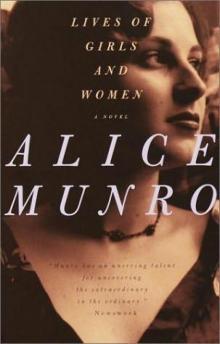 Lives of Girls and Women
Lives of Girls and Women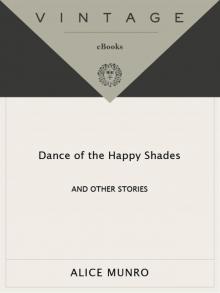 Dance of the Happy Shades
Dance of the Happy Shades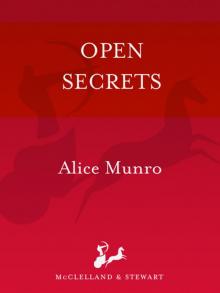 Open Secrets
Open Secrets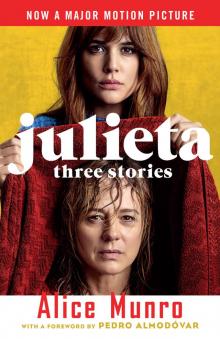 Julieta (Movie Tie-in Edition)
Julieta (Movie Tie-in Edition)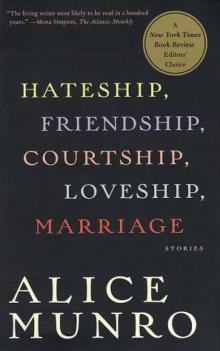 Hateship, Friendship, Courtship, Loveship, Marriage: Stories
Hateship, Friendship, Courtship, Loveship, Marriage: Stories Alice Munro's Best
Alice Munro's Best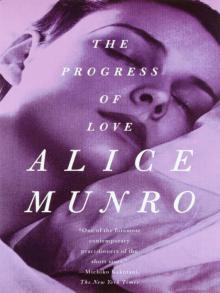 The Progress of Love
The Progress of Love Selected Stories
Selected Stories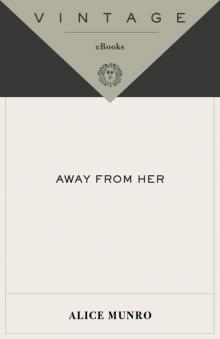 Away from Her
Away from Her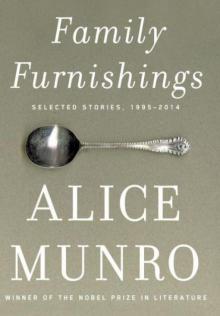 Family Furnishings
Family Furnishings Moons of Jupiter
Moons of Jupiter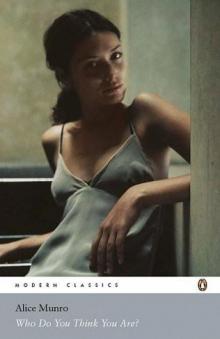 Who Do You Think You Are?
Who Do You Think You Are? Hateship, Friendship, Courtship, Loveship, Marriage
Hateship, Friendship, Courtship, Loveship, Marriage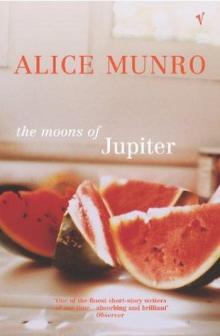 The Moons of Jupiter
The Moons of Jupiter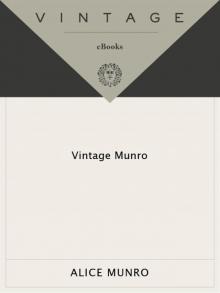 Vintage Munro
Vintage Munro The Love of a Good Woman
The Love of a Good Woman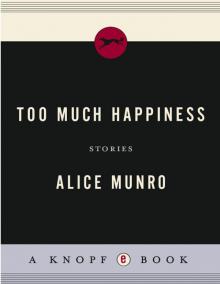 Too Much Happiness
Too Much Happiness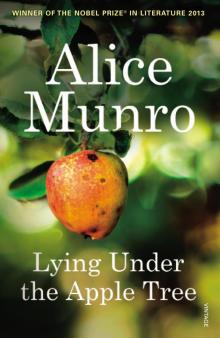 Lying Under the Apple Tree
Lying Under the Apple Tree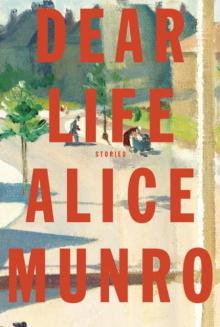 Dear Life
Dear Life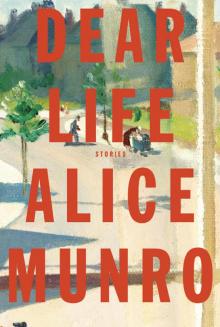 Dear Life: Stories
Dear Life: Stories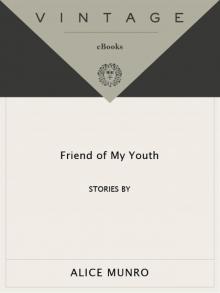 Friend of My Youth
Friend of My Youth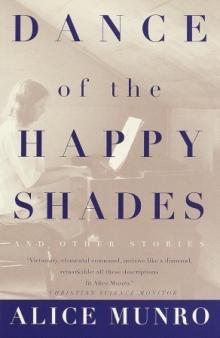 Dance of the Happy Shades: And Other Stories
Dance of the Happy Shades: And Other Stories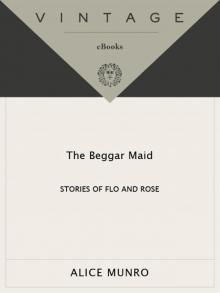 The Beggar Maid
The Beggar Maid